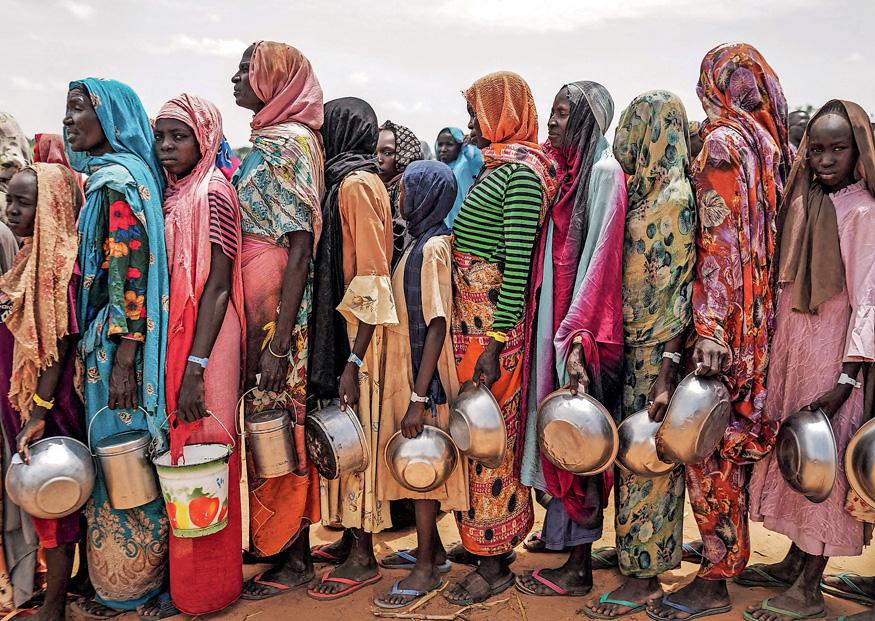يحاول ذهب - حر
US warns of the most catastrophic famine for four decades
June 21, 2024
|The Guardian Weekly
Sudan is facing a famine that could become worse than any the world has seen since Ethiopia 40 years ago, US officials have warned, as aid deliveries continue to be blocked by the warring armies but arms supplies to both sides continue to flow in.

With much of the world's attention focused on Gaza, the scene of another human-made famine, Sudan is already the worst humanitarian crisis in the world and is slipping towards a disaster of historic proportions, with far less media coverage and global concern. A UN humanitarian appeal for the country has received only 16% of the funds it needs.
"We need the world to wake up to the catastrophe happening before our eyes," Linda Thomas-Greenfield, US ambassador to the UN, told reporters.
She was speaking as El Fasher, the capital of the North Darfur region and a former humanitarian hub, faced its second month under siege by the Rapid Support Forces (RSF). A paramilitary group, the RSF has been fighting the Sudanese Armed Forces (SAF) since April 2023, when a power struggle between two rival generals, the SAF's Abdel Fattah al-Burhan, the country's de facto ruler, and the RSF's Mohamed Hamdan Dagalo, also known as Hemedti, escalated into a conflict that has split the country. The civil war has killed over 14,000 people and forced 10 million to flee their homes.
هذه القصة من طبعة June 21, 2024 من The Guardian Weekly.
اشترك في Magzter GOLD للوصول إلى آلاف القصص المتميزة المنسقة، وأكثر من 9000 مجلة وصحيفة.
هل أنت مشترك بالفعل؟ تسجيل الدخول
المزيد من القصص من The Guardian Weekly

The Guardian Weekly
Help at hand: A wave of support after school shooting
When Jim Caruso heard the news of the school shooting in Tumbler Ridge, he knew immediately he needed to be there. He packed his bags and boarded a plane for the community 1,100km away. \"I wanted to be here to bring some level of comfort,\" he said. \"I wanted to hug people, pray for them and, most importantly, to cry with them.\"
3 mins
February 20, 2026

The Guardian Weekly
From rickshaws to running shoes in pursuit of trail glory
Members of a local athletics club who transport passengers for a living are now beating elite athletes in international endurance events
3 mins
February 20, 2026

The Guardian Weekly
AI therapy Patients turn to chatbots for treatment
On a quiet evening in her Abuja hotel, Joy Adeboye, 23, sits on her bed clutching her phone, her mind racing.
2 mins
February 20, 2026
The Guardian Weekly
In these dark times, the World Service must not be allowed to fall silent
“The programmes will neither be very interesting nor very good,” said the then BBC director general John Reith when he launched its Empire Service in December 1932.
2 mins
February 20, 2026

The Guardian Weekly
Everybody wants to be a cat
Genre-hopping bass virtuoso Thundercat discusses Snoop Dogg and Star Wars ahead of the release of his fifth album
7 mins
February 20, 2026

The Guardian Weekly
'Just say no' US politicians offer advice on how to repel Trump
In Munich, Democrats put an end to tradition of the united front to stand among the president's fiercest critics
3 mins
February 20, 2026

The Guardian Weekly
Bird is the word: the secret to serving up perfect roast chicken
What’s the best way to roast a chicken?
2 mins
February 20, 2026

The Guardian Weekly
Sphere we go!
How did an industrial estate in Leipzig end up home to the great Brazilian architect Oscar Niemeyer's final project? Take a seat in his eye-popping restaurant
4 mins
February 20, 2026

The Guardian Weekly
What the repeal of a key climate rule means for America
The Trump administration has dismantled the basis for all US climate regulations, in its most confrontational anti-environment move yet.
2 mins
February 20, 2026

The Guardian Weekly
I could look out the window all day - so no need for curtains
I've never needed to be convinced of the cognitive benefits of looking out the window.
2 mins
February 20, 2026
Listen
Translate
Change font size
